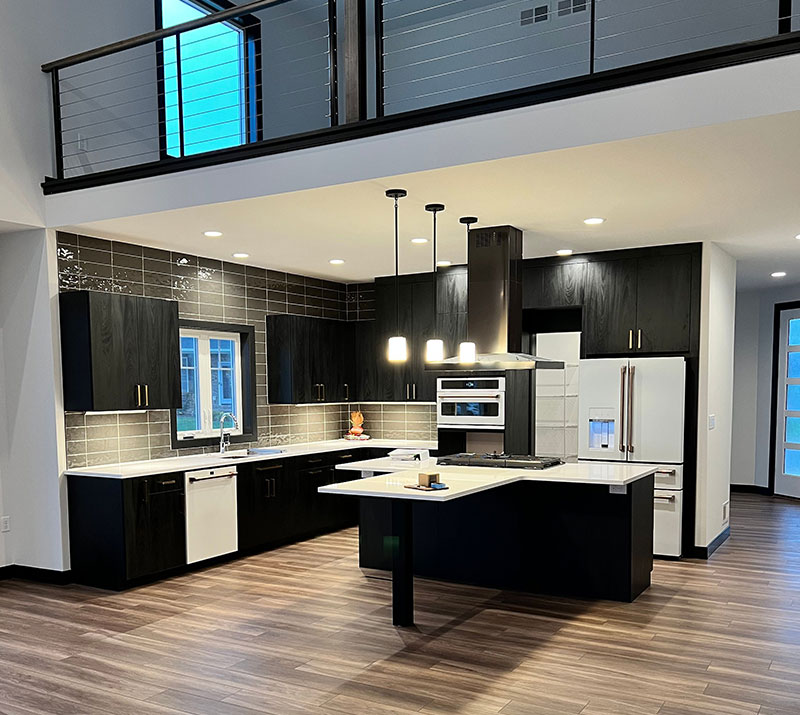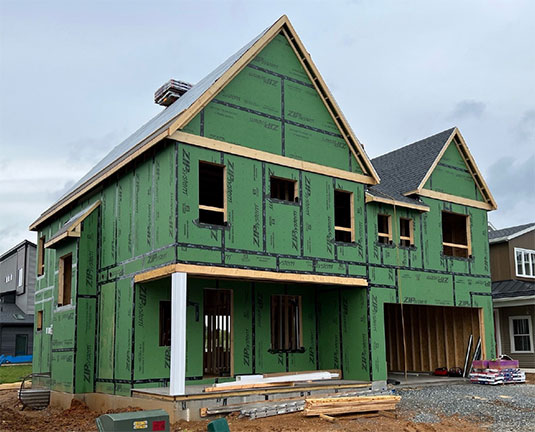December 1st, 2023 | by James Graybill | Posted in Uncategorized |
#energy efficient, #energy star, #modern house, #new home What makes a home modern?
I am sure you are growing tired of hearing the term modern; it seems like an all-encompassing catch-all. Here is our focus when we use the term “modern” to describe our homes. The ability to create both clutter-free and simple spaces while still captivating intrigue. The delicate balance of not too much but not too little. Modernity does not need to be overstated and overpowering. You don’t have to dive into “modern” completely; you can just use aspects that work for you.
Efficiency
On a deeper level that may not be visible but will certainly be felt is energy efficiency. A modern home that is well insulated and vented properly will be much more comfortable. Nothing is better than combining comfort and cost savings on monthly utility bills. Our homes are third-party energy star rated. That means the homes are built to a higher standard, focusing on better air sealing, high-performance windows, efficient heating and cooling systems, better building materials, and better air quality. That is just touching on a few aspects of energy star.
Natural light
Natural light is the other important thing about a modern design that keeps you comfortable. Using large and small windows strategically placed throughout the home is crucial. The variation in sizes can create a more natural, beautiful, asymmetric look. Windows are for much more than just a view of the outside surroundings. A high window can let in ample natural light while still allowing for privacy. We also like to utilize a fixed window, when possible, for a tighter seal.
Open concept
This concept has been introduced previously, but open floor plans make the most sense for today’s modern living. This allows natural light to flood all areas of the house by opening things up. It gives you more flexibility in changing the room layout by defining the spaces with furniture, not walls. This allows the family to be together while doing different things in the house. You can see the kids playing in the living room while cooking supper in the kitchen. This concept also works very well for families who enjoy having guests over and entertaining.
Architecture
Architecture constantly evolves; you are used to seeing arched-top windows, entryways, and homes that are symmetrical with round columns and shutters. Modern is typically cleaner and more simplified, like a home with a more asymmetrical look with horizontal and vertical lines. It can be bold yet complement its natural asymmetrical surroundings. It is geared more towards function but, at the same time, does not lose its captivation. Simple, well-placed details can make all the difference.
October 23rd, 2023 | by James Graybill | Posted in Uncategorized |
#renovate Remodeling an existing home can be rewarding, but it comes with potential risks and challenges:
- Cost Overruns: Renovation projects often exceed initial budgets due to unforeseen issues, plan changes, or unexpected expenses.
- Hidden Problems: As you start remodeling, you might uncover hidden structural, electrical, or plumbing issues that need immediate attention, adding to your costs.
- Timeline Delays: Renovations can take longer than expected due to construction challenges.
- Compromised Quality: If not done carefully, renovations might compromise the integrity of the existing structure or design, affecting long-term value.
- Noise and Disruption: Renovations can be noisy and disruptive to your daily life, making living in the home during the process challenging.
- Resale Value Concerns: Over-customizing to the point that you cannot recover the cost.
- Health and Safety: During renovations, there might be health risks from dust, fumes, and other construction-related hazards.
To mitigate these risks, it’s essential to thoroughly plan, budget for contingencies, research contractors, and communicate effectively with your renovation team. Prioritize transparency and flexibility to manage unexpected challenges that might arise during the remodeling process.
September 21st, 2023 | by James Graybill | Posted in Uncategorized |
#new home, #renovate There are pros and cons to renovating and building a new home. We might be slightly biased, but if you build with a good quality builder, it can be the best decision you can make.
Whether it is cheaper to renovate or build new is a tricky question. There are so many factors that can significantly impact the cost of a renovation. Generally, the labor cost is higher for renovation than for a new build. This can sometimes be offset if you purchase the existing home at a lower price. You also run a greater risk of unexpected costs during a renovation. This is because even the best renovator can’t always predict what is happening inside existing structures. If things were not done correctly when the home was built or things had previously been remodeled, sometimes hidden issues need addressing. A renovation can be worth the money if you have a great location and a contractor who can help you make wise decisions.
Building a new home offers several advantages over buying and renovating an existing one:
- Customization: You have the freedom to design the layout, choose finishes, and incorporate features that suit your preferences and lifestyle.
- Modern Amenities: New homes often come with the latest technology, energy-efficient appliances, and modern designs that might be lacking in older homes.
- Warranty: New constructions typically warrant materials and systems, providing peace of mind against immediate repair costs.
- Energy Efficiency: New homes are built with better insulation and energy-efficient systems, which can lead to lower utility bills and reduced environmental impact.
- Maintenance: With everything new, there’s less likelihood of immediate maintenance issues compared to an older home where you might need to address wear and tear.
- Location Flexibility: When building, you have more flexibility in choosing the location of your home rather than being limited to existing properties in specific areas.
- Resale Value: New homes might appreciate more quickly in value, as they start with the latest amenities and designs that appeal to contemporary buyers.
August 3rd, 2023 | by James Graybill | Posted in FAQ |
#energy efficient, #energy star, #new home A home is considered energy-efficient when designed and built to minimize energy consumption while maximizing comfort and reducing environmental impact. Several factors contribute to making a home energy efficient:
- Insulation: Proper insulation throughout the home, including walls, roof, and floors, helps maintain a consistent indoor temperature by minimizing heat transfer between the interior and exterior. This reduces the need for heating and cooling, resulting in lower energy consumption.
- Energy-Efficient Windows and Doors: Installing energy-efficient windows and doors with double or triple glazing, low-emissivity coatings, and weatherstripping prevents heat loss during winters and heat gain during summers. It reduces the reliance on artificial heating and cooling systems.
- Efficient Heating, Ventilation, and Air Conditioning (HVAC) Systems: Selecting energy-efficient HVAC systems, such as high-efficiency furnaces, heat pumps, and air conditioners, can significantly reduce energy consumption. Regular maintenance and proper sizing of HVAC systems are also essential for optimal efficiency.
- Energy-Efficient Lighting: We install LED lights and or light bulbs in all fixtures in our new homes. Utilizing natural light through well-placed windows, skylights, and light tubes can also minimize the need for artificial lighting during the day.
- Energy-Efficient Appliances and Electronics: Choosing energy-efficient appliances, such as refrigerators, washing machines, dishwashers, and televisions, can result in substantial energy savings over time. Look for appliances with ENERGY STAR ratings, as they meet specific energy efficiency guidelines.
- Water Efficiency: Efficient plumbing fixtures, such as low-flow toilets, faucets, and showerheads, can minimize water consumption.
- Smart Home Technology: Utilizing smart thermostats, occupancy sensors, programmable timers, and energy monitoring systems allows homeowners to have better control over energy usage. These technologies can optimize energy consumption based on occupancy patterns and user preferences.
Alden Homes uses a third-party Inspector for insulation, sealing, and energy audits to help identify areas of energy loss or inefficiency. Addressing issues like air leaks, ductwork problems, and inefficient insulation ensures the home operates at its maximum energy efficiency potential.
Remember, energy efficiency is a holistic approach that involves multiple factors working together. Implementing these measures can reduce energy consumption and environmental impact and lead to long-term cost savings for homeowners. That is why Alden Homes builds energy star rated homes.



